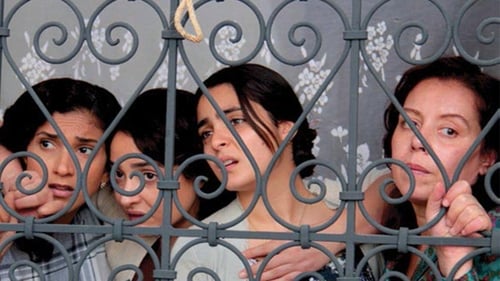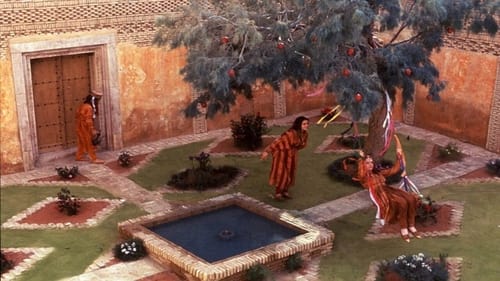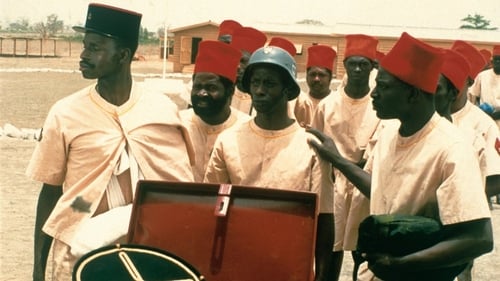
Raises questions without seeking answers, following several characters of all ages, generations and social level as well as a member of the people and an association representative in addition to a sociologist and a psychiatrist. This documentary deals with the issue of racism historically, geographically, economically, culturally, psychologically and socially. A young black graduate from Gabès who returns to the country determined to put his know-how in communication for the benefit of the motherland but his multiple contacts open his eyes to discriminatory attitudes contrary to religious precepts and political choices of his country some of which date back to the 19th century with the abolition of slavery on January 23, 1846 by Ahmed Bey.

Editor
Four women meet at Dar Joued on the eve of Independence. With different ages and social conditions, they are condemned to live together under the authority and injustice of their jailer: "El Jaida". They will share memories of the outside world, joy, emotions and distress of their daily lives.

Editor
Hassouna, a Tunisian officer in the French army, is committed to the cause of independence of his country. He transmits information to the independentists activists' networks. Once he discovers a list of Tunisian betrayers, he faces rejection and persecution.

Editor
Portrait of Tahar Chériaa. Founder of the first african cinefestival and father of panafricanism.

Editor
In order to honor his deceased brother's will and assert his guardianship rights, Mokhtar – a notary in his sixties, single, misogynist and heir like several other relatives – is determined to grant the last wishes of the deceased. ...

Editor
When independence is declared in 1962, the minority communities of Jewish and European origin flee Algeria. Four people of Muslim ascendency searching for the truth about their own lives evoke the last decades of French colonization, the years of war, from 1955 to 1962. Hatred and friendship lead us through a hidden memory: their relationships with their Jewish and Christian neighbours. The foundational myths of the new Algeria are revisited, but will they succeed in getting to the bottom of their own legends?

Editor
THEY KILLED THE SONG! Thirty-year-old Imane lives with her husband and three children in a modest house across from the historic citadel of Aleppo. She suddenly realizes that it's been ten years that she's been married, ten years during which she's done basically nothing more than take care of her husband and their three children.

Editor
A forty-year-old woman refuses to give into the stigma of unwed motherhood and climbs the ladder of success in a male dominated field.

Editor
Wahid and his daughter Soufiya return to Tunisia after a long stay in West Africa.Wahid would like to transform Soufiya into a real Tunisian, a true daughter of their land, but the country has changed a lot in there absence.

Editor
Three well-educated North African women cope with sexual stereotyping in modern Tunisia.
Amina a married Muslim woman living in Tunis with her two daughters. Even though she is allowed certain freedoms as a Muslim woman this is curtailed when she meets her old friend from school Aida.

Editor
The movie shows the rise and fall of a cruel and despotic village chief Guimba, and his son Jangine in a fictional village in the Sahel of Mali.

Editor
The story centers on a devout Muslim, Faco, who tries to run his two-wife household in the traditional way. The trouble begins when his ambitious younger son, Kalifa lapses and gets involved with his older brother's hoodlum friends. Kalifa then gives them his money and soon loses his job. The city has a curfew at night and only those with a highly-prized identity card are allowed out. Police rigorously patrol the streets in search of whores and people without cards. One homeless, unemployed man, Oussou, decides to earn the card by becoming a stoolie for the cops, and snitches on Kalifa's older brother, precipitating a police raid of Faco's home that results in their finding a cache of illegal drugs. Faco and the older son are both stripped naked and thrown in jail. Suddenly Faco finds himself brutalized and humiliated by his Muslim brothers. Meanwhile, the dark-skinned daughter of a white storekeeper, with a lust for black hookers, sets off to find her real mother.

Editor
A community of people rejected by society live in an abandoned residence located in a "Medina": an old town in Tunisia. Al Bab, a local criminal running the residence's prostitution circle, returns from prison on his wedding day.
Fraj, his brother and the town warlock, falls in love with Ramla, his brother's future wife: He is the only man of the residence who has seen her face, as she is kept prisoner in one of the rooms until the wedding night.

Editor
This second feature in Nacer Khemir's Desert Trilogy is a visually ravishing folktale reminiscent of "The Thousand and One Nights." The story revolves around Hassan, who is studying Arabic calligraphy from a grand master. Coming across a fragment of manuscript, Hassan goes in search of the missing pieces, believing that once he finds them, he will learn the secrets of love. With the help of Zin, a lovers’ go-between, he meets the beautiful Aziz, Princess of Samarkand. After encountering wars, a battle between false prophets and an ancient curse, he learns that an entire lifetime would not suffice for him to learn the many dimensions of love.

Editor
A Senegalese platoon of soldiers from the French Free Army are returned from combat in France and held for a temporary time in a military encampment with barbed wire fences and guard towers in the desert. Among their numbers are Sergeant Diatta, the charismatic leader of the troop who was educated in Paris and has a French wife and child, and Pays, a Senegalese soldier left in a state of shock from the war and concentration camps and who can only speak in guttural screams and grunts.














